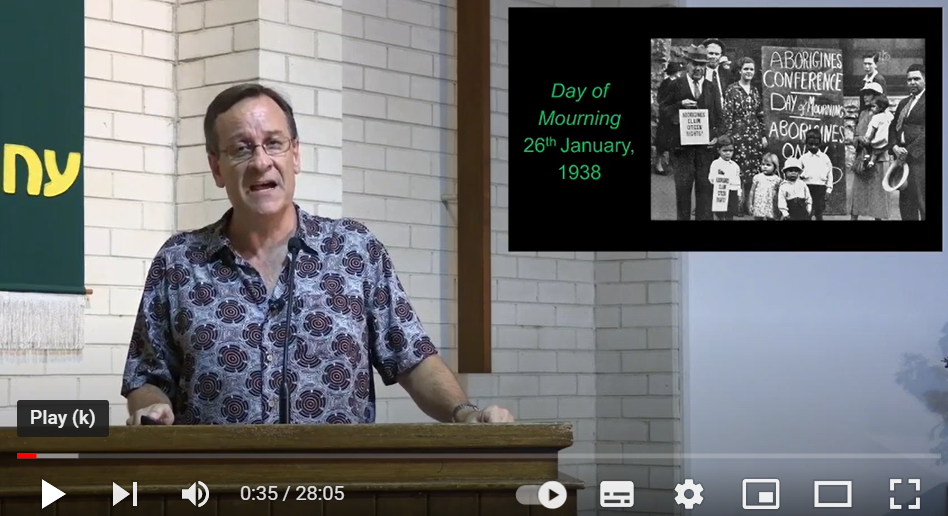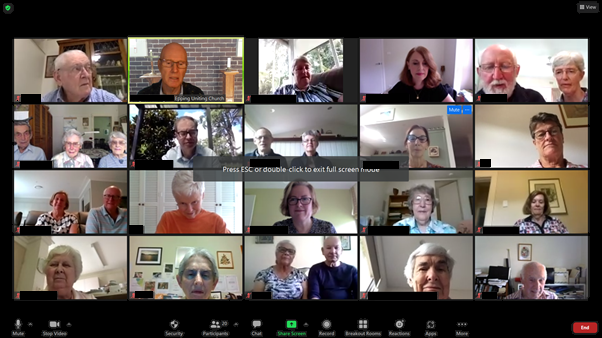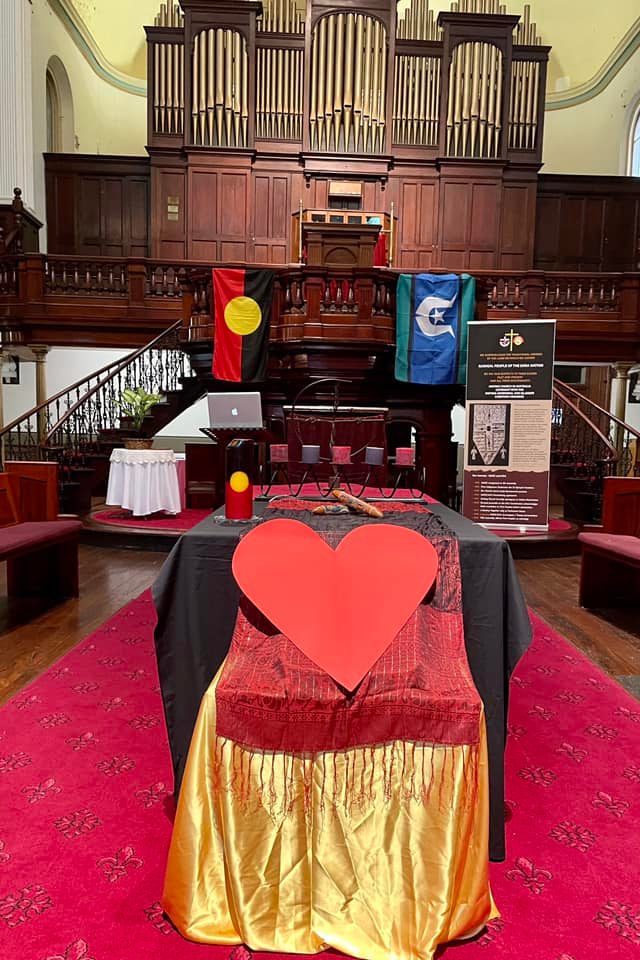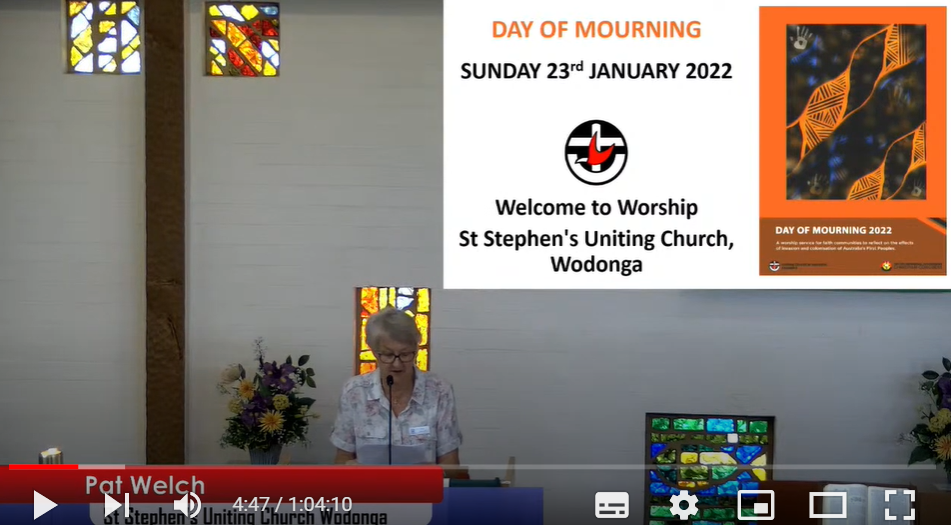Churches mark a Day of Mourning
January 25, 2022
Uniting Church members marked a Day of Mourning on Sunday 23 January 2022 holding worship services which invited people to reflect on the effects of invasion and colonisation on Australia's First Peoples.
More than 60 congregations and communities registered for the Day of Mourning. We share some reflections from UCA members on this day.
Revesby Uniting Church in Sydney’s south-west hosted a Day of Mourning service online. Minister Rev Michael Barnes said the Uniting Church marked a Day of Mourning at the request of the Uniting Aboriginal and Islander Christian Congress (UAICC).
“We do so to reflect on and lament the impact of colonisation on the First Nation peoples of this land since European settlement in 1788. Today we reflect, we lament and we mourn.”
Watch the service on YouTube: https://www.youtube.com/watch?v=IIaacKHuikg&t=19s
Pitt Street Uniting Church in Sydney also shared in a Day of Mourning service. Rev Josephine Inkpin shared the homily, which included reflections on the words ‘galgala’ and ‘yabun’, in the language of the Gadigal peoples, the First Peoples of the land where the Church is located.
“Years ago, I worked for a while with the Aboriginal and Torres Strait Islander Commission of the National Council of Churches. It was an extraordinary time of learning and challenge, of fun, growth, and despair. At my exit interview, my boss asked me what I had particularly learned. So many things, I responded, including not least so much that I have to unlearn. Above all however, I said, it was relationship: Relationship – relationship – relationship: on so many ways, and levels; with all things; at a depth of such intimacy and interconnection; despite so many huge ruptures, violence and dispossession – past and present, in individual lives, families, and communities. Without grasping the importance of relationship– what Pitjantjara people call kanyini – we are lost.” Read more here: https://www.penandinkreflections.org/blog/relationship-galgala-yabun
The service at Koonung Heights UCA in Melbourne was led by Deacon Jenny Preston. It included the music of Craig Mitchell and David McGregor, How shall we sing, and reflection on the tradition of Dadirri, the concept of deep listening central to the spirituality of Miriam Rose Ungunmerr-Baumann.
“One of the challenges I hear from Miriam Rose is for us as a congregation to continue listening to Indigenous voices. We must practise deep listening and discernment with and among each other – for together we form the Spirit’s voice… as we endeavour to act justly, love mercy and walk humbly in fellowship with our First Peoples,” said Jenny.
The minister at Kippax Uniting Church in Canberra, Karyl Davison, said their Day of Mourning service was warmly received. Comments from participants included, “Thanks for bringing us such an inspiring message this morning. The layers of mourning concept speaks to the depth and complexity of the issue but in asking the question ‘what can we do for you, what will make amends’ then responding appropriately is at least a start. So as the 26th rolls around, at least some of us will have a stronger framework within which to think, to raise in conversations and be encouraged to confront and challenge injustice.”
And also, “Thank you for having the Uluru Statement of the Heart read out. Unfortunately, like many people, I have not read or heard it read before. May this start a ground-swell of change throughout our country.”
“Thank you and all the Uniting Churches who have been courageous and explored this subject today, and helped to create a greater understanding of what has occurred.”
Ferntree Gully UCA in Victoria held a service with a focus on standing in solidarity with First Peoples. Ray Higgs reports, "Fifteen of our congregation met outside in a circle around a small table displaying Aboriginal artifacts and the Christ candle. We followed the liturgy made available by the UCA with its helpful prayers and words. It was printed in an 8 page book. Its centre was the Lament. To own it, we all read it together."
Many comments and questions were raised and discussed. The importance of truth-seeking, truth-listening and truth-telling, historical honesty, dialogue, action, listening and learning.
Ray concluded with a reflection on Mark 9: 16 – 29 (the disciples’ failure to excise the impossible demon). “I have within me an irreconcilable contradiction. On one hand, I worship the God of justice. I value honestly and truth. On the other, I live on stolen land. I am a political descendent of the invaders. I participate in a society that ignores its black history and has prospered by the invasion. But that’s not the demon. That’s something I have inherited and cannot help. My demon is thinking the contradiction is OK, that it is normal. Jesus is our hope. Only he, by love and faith could excise the impossible demon. Jesus is at work. A new community is required. It is already emerging as we see more and more First and Second Peoples walk together. Come, Lord Jesus.”
With passion, John Cranmer recited a poem he had especially written for such an occasion, “A Radical Forgetting and the Remaking of a Nation” We concluded with much focused conversation over morning tea.
St Stephen's UCA in Wodonga, Victoria, livestreamed their Day of Mourning service which was led by members of the congregation’s First Nations discussion group.
Watch here: https://www.youtube.com/watch?v=ZNdSmj2CLO8
At Trinity Uniting Church in Perth, a service led by Rev Marie Wilson reflected on the high rates of incarceration of First Peoples in Australia, and the opportunities given to First Peoples on the sporting field.
Epping Uniting Church in Sydney shared in an online service. Lynda Cameron, a member of Beecroft-Pennant Hills Uniting Church and local social justice group, Uniting Church Action for Society and Environment (UCASE), prepared a reflection.






